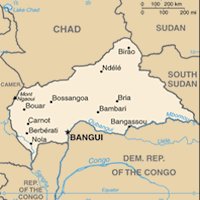As I’ve said before several times — I really think think the make-or-break factor for would-be or quasi state actor organizations like ISIS is their ability to provide and sustain vital, basic-level government services and employment to their subject populations. Conversely, their opponents would have to find a way to disrupt the supporting physical infrastructure, the bureaucrats administrating the system, and the low-level employees implementing the policies each day.
The New York Times ran an article Thursday on how U.S. airstrikes have affected all three, but my main takeaway was more documentation of the brass-tacks approach of ISIS (once they stop mass-murdering people, of course):
It was not that the militants were popular in Raqqa [the “Islamic State” “capital”], according to nearly a dozen residents, who spoke in interviews in the city or across the border in Turkey. Rather, the Islamic State had become an indispensable service provider.
[…]
Reflecting how civilian life in the area has become intertwined with the militants — who paid salaries, ran schools and directed traffic — 10 civilians were killed in a coalition airstrike on Sunday that hit one of the oil facilities run by the Islamic State, where many people had found work.
Acceptance of the Islamic State in northern Syria contrasts sharply with Iraq, where the group’s ascendance has been more contested and its response more brutal. Many Iraqis clamor for a return of the government, despite its unpopularity, especially in Sunni regions.
This extends and expands the point I made in early September (when the US intervention was limited to the occupied Iraqi zones, rather than the economic heart of ISIS), when I cited a Reuters report on ISIS bakeries, hydroelectric power plants, and telecoms in their so-called “Forat Province” administrative area. From Reuters:
According to one fighter, a former Assad employee is now in charge of mills and distributing flour to bakeries in Raqqa. Employees at the Raqqa dam, which provides the city with electricity and water, have remained in their posts.
[…]
They have been helped by experts who have come from countries including in North Africa and Europe. The man Baghdadi appointed to run and develop Raqqa’s telecoms, for instance, is a Tunisian with a PhD in the subject who left Tunisia to join the group and serve “the state”.
Sure they can’t keep the lights on for more than six hours a day, and sure they’ve stupidly sent all their beat cops from Raqqa to Kobani in large convoys to be deployed in clusters that are easy targets for the United States Air Force. But they really were building a new state out of the civil war’s rubble before the Syrian and American planes finally showed up to put a stop to it. That’s not particularly laudable in their case per se, but it’s worth observing.
Recognized states across the region should take note: Ensuring day to day services reach the public is a tool of a universal language and creed, which fosters legitimacy and support … and even good will if the providers aren’t too murderous.
For most people, from one day to the next, it’s all about the quality and effectiveness of governance at the smallest and most local level. Everything is else is just world politics.

Theoretical maximum sphere of ISIS control as of September 4 2014, via Wikimedia 3 weeks before US airstrikes began in Syria. Keep in mind that control was and is tenuous in outlying desert village areas and limited to major thoroughfares/cities in many areas. There has been considerable debate over how to map the situation more accurately.







